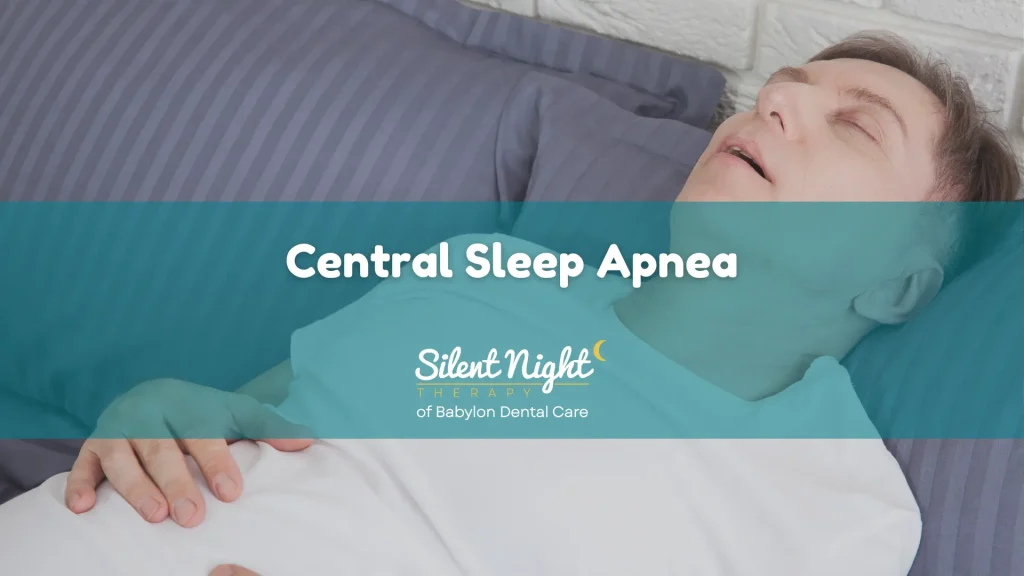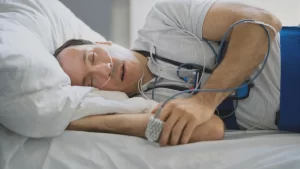
Sleep apnea is a severe condition that causes people to stop breathing while they sleep. If your breathing is repeatedly interrupted while you sleep, you should not ignore it. You might have sleep apnea, which can lead to massive health complications. There are three main types of sleep apnea:
- Obstructive sleep apnea: This is the most common type of sleep apnea and occurs because of physical obstruction in your airway. For example, your tongue may fall backward while you sleep and block your airway.
- Central sleep apnea: This type of sleep apnea happens when your brain fails to send the correct signals to tell you to breathe.
- Complex sleep apnea: This type of apnea is a combination of the other two types.
If you wake up trying to catch your breath or are experiencing daytime sleepiness, it may be a sign that you have sleep apnea. Failing to get sleep apnea diagnosed can be dangerous. The West Babylon sleep experts from Silent Night Therapy can help diagnose why you’re having a hard time sleeping. Call us at [phone number] for a complimentary consultation.
Causes of Central Sleep Apnea
is caused by your brain’s failure to send signals to the muscles that control your breathing. In some cases, central sleep apnea can be associated with other medical conditions, including:
- Heart failure
- Stroke
- Brain tumors
This is because these conditions can affect the part of the brain that is responsible for breathing, leading to central sleep apnea. However, it can also be caused by certain medications, such as opioids or benzodiazepines.
Symptoms of Central Sleep Apnea
The symptoms of central sleep apnea are similar to those of obstructive sleep apnea. Some common symptoms of central sleep apnea are:
- Loud snoring: Snoring may be a sign of sleep apnea if you snore loudly. This is one of the most common signs of sleep apnea, so don’t ignore your loud snoring.
- Daytime sleepiness: People with central sleep apnea may experience daytime sleepiness because they aren’t getting good sleep. If you are experiencing daytime sleepiness after a full night’s sleep, don’t ignore it.
- Breathing interruptions: This is one of the common signs that you have central sleep apnea. If you wake up gasping for air or choking, you may have difficulty breathing while asleep.
- Awakening with a dry mouth or sore throat: If you wake up with a dry mouth or sore throat and your sleep environment hasn’t changed, it may be a sign that you have sleep apnea.
- Difficulty concentrating: People with sleep apnea may have trouble concentrating, deal with memory loss, or have reduced cognitive function. This is because humans usually cannot function without a decent night’s sleep. If you are dealing with these issues, it is a sign you may have sleep apnea.
Diagnosis of Central Sleep Apnea
Diagnosing central sleep apnea is usually done through two common tests, including:
- In-person sleep study: When you do an in-person sleep study, it is usually polysomnography. During the polysomnography, you will sleep somewhere for the night where you will be monitored. During this process, your brain waves, oxygen levels, heart rate, and breathing patterns will be monitored while you sleep.
- Home sleep study: In some cases, you may be able to take a portable monitoring device home to measure your sleep. This device will monitor your breathing patterns, heart rate, and blood oxygen levels.
Once the sleep study is complete, it can be used to determine the severity of your sleep apnea and guide the treatment plan.
Treatment for Central Sleep Apnea
 The treatment for central sleep apnea can vary depending on the condition’s underlying cause. Sometimes, treatment may not be required because the condition will resolve independently. Other times, treatment may be necessary to alleviate the symptoms and prevent complications. Some treatment plans that may help include:
The treatment for central sleep apnea can vary depending on the condition’s underlying cause. Sometimes, treatment may not be required because the condition will resolve independently. Other times, treatment may be necessary to alleviate the symptoms and prevent complications. Some treatment plans that may help include:
- Treatment of the underlying issue: If an underlying medical condition is causing your sleep apnea, treating it may resolve the apnea.
- Continuous Positive Airway Pressure (CPAP) Therapy: CPAP therapy is a common treatment for central sleep apnea. This treatment uses a machine that delivers air through a mask to keep your airway open while sleeping.
- Adaptive Servo-Ventilation (ASV): ASV is a newer sleep apnea treatment involving a machine that detects a pause in breathing. When the delay is detected, it will deliver more pressurized air until your breathing returns to normal.
- Oxygen therapy: If your oxygen levels are dropping during your sleep, causing your central sleep apnea, oxygen therapy may be recommended to keep them level.
- Medication: Sometimes, medication can help regulate your breathing.
Additionally, in some cases, oral appliance therapy may be an option. Oral appliance therapy can be more comfortable than other treatments for central sleep apnea because the appliance is worn like a retainer that fits over your teeth and supports your jaw. At Silent Night Therapy, we offer four types of oral appliance devices, including:
- Respite Blue+: This is a custom mouthpiece that features a dual-lock design with interlocking wings. The design of this device keeps your airway open, allowing for a wide range of movement while you sleep.
- Dynaflex Dorsal: This device is one of Silent Night Therapy’s most popular oral appliances used to treat snoring and sleep apnea. The design of this device allows for lateral jaw movement while dictating a specific mandibular position. The Dynaflex Dorsal is comfortable and effective in treating sleep apnea.
- The Adjustable Herbst: This device allows you to make adjustments until you get your mandible in the desired position. Using the hinged mechanism of The Adjustable Herbst to get the largest bone in your skull into place can help resolve your sleep apnea.
- The Elastic Mandibular Advancement (EMA): This is the smallest appliance for treating obstructive sleep apnea, but it can provide unmatched lateral movements and comfort. The EMA allows you to dictate your mandibular advancement to resolve sleep apnea without making your jaw hurt.
Contact Silent Night Therapy Today for a Free Consultation
Central sleep apnea is a severe medical condition that can be extremely scary. At Silent Night Therapy, we have treated patients with sleep-related disorders since 1983. Our team can help you get your sleeping back on track.
If you have difficulty sleeping, don’t keep suffering through bad nights and sleepy days. Instead, contact us today at (631) 983-2463 for an evaluation.